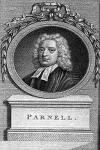A thoughfull Being, long and spare,
Our race of Mortals call him Care,
(Were Homer living well he knew
What Name the Gods woud call him too)
With fine Mechanick Genius wrought,
And lovd to work tho no one bought.
This Being by a Model bred
In Joves eternal sable head,
Contrivd a Shape impowrd to breath
And be the worldling here beneath.
The Man rose staring, like a stake,
Wondring to see himself awake;
Then lookd so wise before he knew
The buisness he was made to do,
That pleasd to see with what a grace,
He gravely showd his forward face,
Jove talkd of breeding him on high
An under-something of the Sky.
But ere he gave the mighty nod,
Which ever binds a Poets God,
For which his curles Ambrosial shake,
And Parent Earth's oblidgd to quake,
He felt her move, he saw her rise,
She stood confessd before his eyes.
But not with what we read she wore,
A Castle for a crown before,
Or lengthning streets and longer roads;
Dangling behind her like Commodes:
As yet with onely wreaths She drest,
She traild a landskip-painted vest;
And thrice she raisd, as Ovid said,
And thrice she bowd her weighty head.
Her honours made, great Jove, she cryd,
The man was fashiond from my side,
His hands, his heart, his head are mine,
Then what hast thou to call him thine?
Nay rather ask, ye Monarch said,
What boots his hand, his heart, his head,
Were what I gave removd away,
Thy part's an Idle shape of clay.
To shares apiece, says artfull Care,
Your pleas woud make your titles fair,
You claim The body, you the soul;
But I who Joynd them claim the whole.
Thus with the Gods debate began,
On such a trivial cause as man.
And can Celestial tempers rage!
(Quoth Virgil in a later age.)
As thus they wrangled Time came by;
(Theres none who paints him such as I;
For what the Fabling Ancients sung,
Makes Saturn old when Time was young)
As yet his winters had not shed
Their silver honours on his head,
He Just had got his pinions free,
From his old sire Eternity.
A serpent Girdled round he wore,
The tail within the mouth before,
By which our Almanacks are clear,
That learned Ægypt meant the Year.
A staff he carryd, where on high
He fixd a glass to Measure by;
As Amber boxes made a show
For heads of Canes an age agoe.
His Vest for day and night was pyd;
A bending Sickle arms his side;
And Springs new months his train adorn;
(The Other Seasons were unborn)
Known by the Gods as near he draws
They make him Umpire of the Cause.
Ore a low trunk his arm he layd,
Where since his Hours a Dial made.
Then leaning heard the nice debate,
And thus pronouncd the words of Fate.
Since Body from the Parent Earth,
And Soul from Jove receivd a Birth,
Return they where they first began,
But since their Union makes the man,
Till Jove & Earth shall Part the two,
To Care who Joynd them Man be due.
He said, & sprung with swift career
To trace a Circle for the year,
Where since the seasons ever wheel,
And tread on one anothers heel.
Tis well, says Jove, & for Consent
Thundring he shook the firmament.
Our Umpire Time shall have his way,
With Care I lett the Creature stay.
But thou for whom he seems to breath
Shall half defeat thy grant beneath:
For Time whose forces should be shown,
When Natures harvest fully grown
Bows with the Mellowd ears of grain,
And longs to Prostrate on ye plain,
Will Natures bended Sickle bear
But till he gets ye Scythes of Care.
Then Toil shall rise from fond desire,
And Idleness & buisness tire,
Bright Glory strain for Shades of Joy,
Soft Pleasure but to Pains decoy,
Ambition Vex, or Av'rice blind,
And doubt & knowledge rack ye Mind,
Mad Errour act, Opinion speak,
Low want afflict, & Sickness break,
Wild Anger burn, dejection chill,
And Joy distract, & Sorrow kill.
Thus armd by Care & taught to mow,
Time Draws the long promiscuous blow,
And wasted Man, whose quick decay
Comes hurrying on before the day,
Will onely find by this decree,
The Soul flys sooner back to me.






